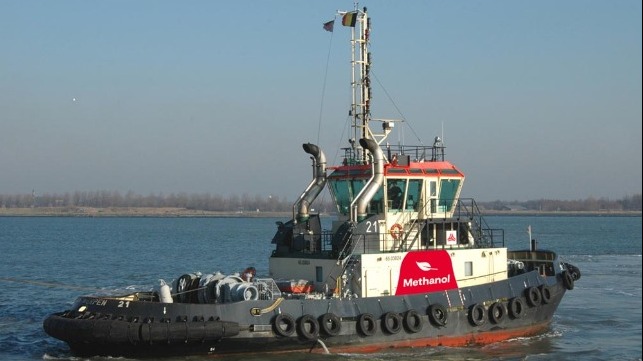First Methanol Fueled Tug to be Demonstrated in Antwerp

In a new effort to further demonstrate the feasibility of methanol as a sustainable marine fuel including in inland operations, the Port of Antwerp will convert the world’s first tug to methanol propulsion. The European Commission approved the project and the vessel which has been dubbed “methatug” is expected to be operational in early 2022.
According to the Port of Antwerp, the project required detailed negotiations lasting 18 months with the regulators to win approval. Rhine-based inland navigation craft must comply with the Central Commission for Navigation on the Rhine’s (CCNR) regulations, which had previously forbidden the use of methanol as a marine fuel. To receive the necessary dispensation, the methatug project was therefore submitted to the CESNI, the European committee that administers overall standards for inland navigation.
Jacques Vandermeiren, CEO of Port of Antwerp said "Together with our partners, we are constantly looking for innovative applications and opportunities for the transition to alternative and renewable energy sources. This methatug is a further and important step in the transition towards a sustainable and CO2-neutral port that has enabled us to overcome a variety of technical and regulatory challenges.”
Six years ago, the first ship was converted to operate on methanol propulsion, the 1,500-passengers car ferry Stena Germanica. In the demonstration project, Wartsila working with Methanex Corporation and the Swedish ferry company Stena Line outfitted the ferry which operates across the Baltic. Methanex through its subsidiary, the Waterfront Shipping Company, has also developed tankers operating on the fuel.
Methanol is viewed as one of the possible transition fuels available for the shipping industry. Maersk has expressed its support for methanol, and CMA CGM has also begun an exploration of the production as a possible fuel source. The Port of Antwerp and its partners hope that the tug project will help to expand the inland use of methanol as a marine fuel.
According to port officials, this marine fuel first forms part of a comprehensive greening program for the Port of Antwerp's fleet. The organization will systematically strive to integrate the most environmentally friendly technologies. By 2025, it aims to become a fully-fledged multi-fuel port, in which seagoing and inland vessels will be able to bunker, not only conventional fuels but also low-carbon alternatives such as methanol, hydrogen, or electricity.
The methatug is part of the Fastwater project, which was set up by a group of European maritime research and technology leaders, including the Port of Antwerp. The project development was funded by the European research and innovation program, Horizon 2020.
Besides Port of Antwerp, which is supplying the tugboat, several other partners are involved in this project. The Belgian engineering company, Multi, carried out the feasibility study. Swedish shipbuilder, Scandinaos, designed the vessel’s modifications, Anglo Belgian Corporation is responsible for converting the engine and for installing the methanol tanks and pipes, while the German company, Heinzmann, is adapting the injectors.

that matters most
Get the latest maritime news delivered to your inbox daily.
“Just like with the hydrotug, the hydrogen tugboat, this project confirms our role in the field of energy transition," said Annick De Ridder, port alderwoman. In a separate project, the Port of Antwerp is working to commission in 2023 a hydrogen-powered tug that will use a combination of hydrogen and diesel to fuel its engines.
